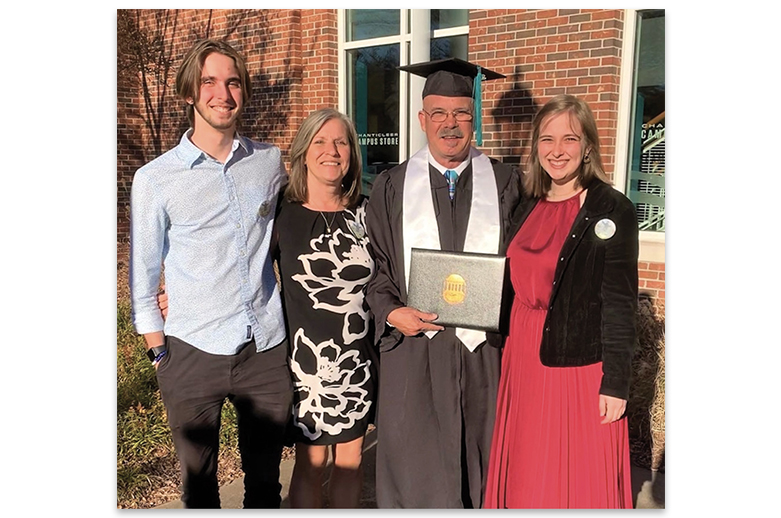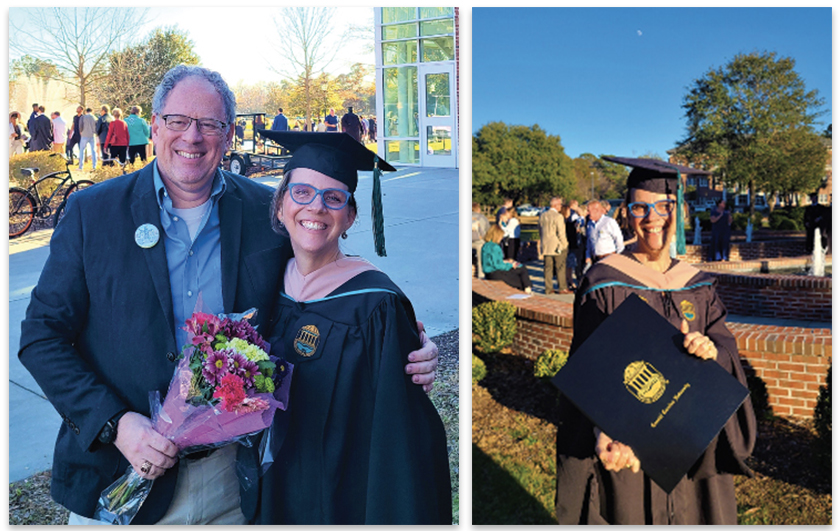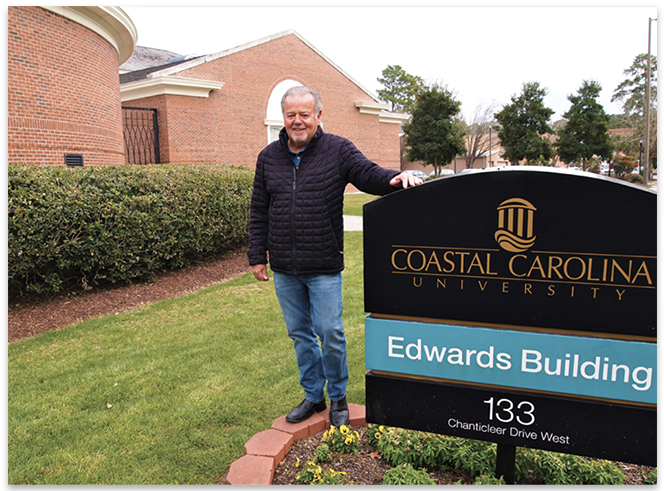Retirees and adult locals of all ages are back in class

Though universities, colleges and technical schools around the United States are primarily filled with the 18- to 22-year-old crowd, it seems like every classroom in nearly every higher education institution has its share of older students—much older students—who’ve returned for a variety of reasons. That certainly holds true at our two area schools, both Horry-Georgetown Technical College (HGTC) and Coastal Carolina University (CCU), which, as state public institutions, offer free tuition to in-state residents over 60. We recently spoke with three, bright, non-traditional older students, ranging in age from 47 to 73. The two oldest took advantage of the no-cost program, and we asked them all about their collegiate experience and motivations for all that hard work.
These three and others like them have returned to school out of a love for learning; others are fulfilling promises they made to themselves decades earlier, and still others are back in class to reinvent themselves in pursuit of a midlife career change. Those over 60 living in South Carolina have a special incentive to return: free education and zero tuition, minus a few administrative and extracurricular costs, thanks to a state mandate that encourages the practice.

“That was certainly true for me,” says Wayne Cockfield, 66, local musician and private stringed instrument instructor. “When I hit 60 and found out I could take advantage of free tuition from Coastal Carolina University, I started to really think about it. I actually used to teach some guitar at CCU back when Steve Bailey was doing more day-to-day work in the music department, but because I didn’t have a college degree, I knew it wouldn’t last.”
Cockfield, who had only a high school diploma and a Guitar Institute of Technology degree, graduated from CCU in December 2021 with a BA in Music, a four-year degree he pursued while working full time and still maintaining a 4.0 average—summa cum laude. It’s estimated that he saved around $60,000 in tuition costs and had all of his incidental costs, i.e. lab fees, and books, etc., covered through federal aid programs. Like many others around the state, Cockfield took full advantage of the state’s free tuition program for those over 60 who also meet eligibility requirements, the same as any other student: a reasonably qualifying high school transcript, proof of at least one year of residency, and acceptance into the school’s program of choice.
“I started going part time,” continues Cockfield, “to computer science courses, but when I decided to pursue the music degree—I took summer classes, too—blasted the degree out in three years, but was in school for a total of about five years.”

Kristi Burch, 47, has raised three children, a fourth generation of Myrtle Beach locals, with her husband, Colin Burch, who is a lecturer at CCU teaching a variety of master’s level and freshman writing and English courses.
“We’re better than halfway through our empty nesting,” says Burch, with one high school-aged child still in boarding school out of state and two older girls already out of the house.
“When it became obvious that the pandemic wasn’t going to end quickly, I wanted something productive to do with that time. I had also thought that I would pursue a new career and felt an MBA [Masters of Business Administration] would help immensely, so 25 years after graduating from Meredith College, I went back to school in January 2021. I finished the degree in one year, summer classes and all—pretty speedy. I do not encourage or recommend that,” she laughs.
Now armed with a freshly minted MBA from CCU, Burch feels she’s ready to perhaps tackle commercial real estate investment and development, though she’s “taking a sabbatical” this spring to finalize her plans.
Burch comes by her entrepreneurial spirit honestly and has had her own various businesses for decades. Anyone who’s ever played mini golf along the Grand Strand has likely played at one of her father’s (Tom Merrell) designed and built courses. Merrell is responsible for the design and build of around 50 percent of all the mini golf courses in the area, and all the Burroughs & Chapin owned courses.

For 73-year-old Myrtle Beach resident Ken Laremore, who will complete an MAW (Master of Arts in Writing) degree from CCU this spring, his pursuit of a postgraduate degree was simple: he wanted expert eyes to tell him he was on the right track as he pursues creative writing.
“I’m loving creative writing,” says Laremore. “I don’t love the poetry part. I wrote a short crime drama novel as an assignment for one of my classes, the Short Novel Workshop, from an idea I’ve had for 30 years.”
Laremore grew up on Long Island and focused on academics as a high school student, earning him a full-ride academic scholarship to Fordham University in the Bronx, N.Y.
“I grew up poor,” he says, “and never would have made it to college without the scholarship that only came from good grades. I don’t say that to cry about it, but sometimes when I’m in class with these kids, Millennials, many seem very entitled. I just have to keep my mouth shut. Most of the kids are great, though.
“I also have an MBA, but this Master’s in writing is for enjoyment. I think I have a talent for writing,” and, he says, the experience of a life well lived. Laremore worked in the building materials industry for many years and has traveled much of the world. He and his longtime girlfriend have enjoyed living in the area full time since 2010.
Why degree programs?
“I could have audited some writing classes, [taking classes without earning credits],” says Laremore, “but then I thought, why not matriculate, get the credit for it? I’m doing the time, doing the work, I want the degree.”
And, as a 73-year-old, it’s free.
The MAW program typically takes about two years for full-time students. Laremore, a part-time student, expects to finish his Master’s in a little over four years total time.
Burch felt that to be taken seriously in a possible new career in commercial real estate development, the degree might open doors. Plus, she says she needed the education on modern business techniques that the MBA delivered.
Cockfield may wish to return to college-level musical instruction in the future, but primarily felt like if he was putting in the time like the others, why not get the degree?
How easy is it, really, to get a free education?
“I found the admissions process fairly easy,” says Cockfield. “A lot of people along the way told me, statistically, you’ll probably quit before you get a degree, but we’re more than happy to work with you.”
The hardest part was obtaining decades-old high school transcripts, say both Burch and Cockfield, but there were other challenges as well.
“You can get denied a class because it’s full, but I didn’t run into much of that,” says Cockfield. “The first classes I took were online. I was trying to maintain a full teaching schedule and some gigs, but as the pandemic eased, returning to the classroom helped. I had a great guitar teacher, Timothy Fischer. He was so excellent and so helpful. I had some classes with another teacher and old friend, Dan O’Reilly.”
Burch needed help with CCU’s Accessibility & Disability office for some accommodations needed because of a lifelong learning disorder, dyslexia.
“I could not have completed the degree without that office’s help,” she notes.
Laremore has a different take on the most difficult part of the process: “the parking,” he said emphatically.
Always the oldest students in class?
“It felt a little awkward,” says Cockfield, “always being the oldest guy in the class, and it was nice to occasionally see others around your age, and there were a few. I even took some classes with my 19-year-old son, Matthew, who is a music major—and that was very cool. Most kids figured out we were father and son pretty quickly. My daughter is at HGTC getting a graphic design degree.”
Casey Woodling, Director of Academic Outreach and Continuing Education/Senior Lecturer at CCU, answers student’s questions all day, every day.
“It can be tricky,” he says of taking advantage of the over-60 free tuition program, “as you need residency requirements and the instructor’s permission, and room in the class—the timing doesn’t always work out, but it is a huge perk when it does. We are a public institution supported by taxpayers; it’s a part of our mandate. We are focusing more and more on non-traditional students.”
Woodling’s office is also over the Lifelong Learning Program, OLLI (Osher Lifelong Learning Institute). The Osher Foundation helps fund non-degree classes of all sorts taught by CCU faculty and others with special expertise. These programs are far more popular and accessible for seniors and retirees than the degree programs.
Campus Life?
“We went to a lot of football games,” says Cockfield, “and that was great fun, but no, I didn’t have a lot of time to hangout.”
“I went to a few football games,” says Laremore, “and a couple of shows, but did I hang out on campus? Ugh, no.”
How to get started?
A phone call to the Admissions Office is the first stop for anyone wishing to pursue a degree. A boatload of transfer requests, transcripts, applications and essays will follow, but there’s a dedicated staff to see anyone, of any age, through the process.
But why seek a degree at all?
For Laremore, it boiled down to needing a critical eye.
“I wanted someone with real expertise to weigh in on my writing and evaluate it—it’s something you just can’t do on your own, “ he says. “When a college professor says, ‘you know, this is good, or this is bad, and here’s why…’ that’s what I wanted and needed, and that’s what I got,” along with the sheepskin to prove it.
For more information on the programs mentioned above, visit coastal.edu